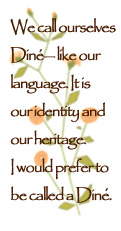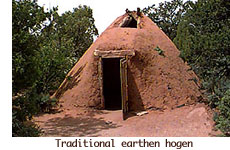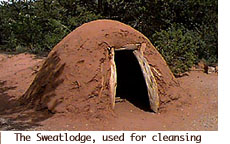
    
|
Next-generation Medicine Man- An interview with Albert Laughter.
My family goes back several generations. We were not held captive in Fort Sumner. My family grew up in what is now the Canyon Lands. Over the years I have been asked questions by a number of interested people from universities and I have welcomed the opportunity to share my culture and to learn about their culture.
Our ways are different. We are not a scriptual type of people. We are not known to be writers, we are known to be symbolizers. We may use a symbol or a color to represent a concept. When we teach something or we are shown something, you will only hear it once - you will not hear it again. If you hear it the second time it will not be the same as you heard it the first time and it will not be as strong a message. That is why we use symbols to represent the meaning of important teachings. Although we have clans within our tribe, it is the elders in our family who are the ones who answer our questions and give us our tradition. When old people speak we listen because the spirit is speaking through them, the spirit is within them. When we speak with the old people, the old spirits are with them and are speaking through them. That is how we answer the questions from the young people. The word "Navajo" I am used to being called Navajo. It is a Spanish word that has a meaning that is not nice. It means renegade. We call ourselves Diné (dee-neh)- like our language. It is our identity and our heritage. I would prefer to be called a Diné. On Ceremonies In my family I am more or less the one who is looked up to because I am asked to explain things to the younger members of the family. I do some chanting with my father, often throughout the night and I assist my father, the Medicine Man, in his chanting and praying. There are about two hundred sacred songs but we can only use about twenty four or thirty six songs because they must stop when the big morning star is in the sky. We call it the big star and when it comes, about mid-morning, we stop singing. So we sing by these stars. Some of these songs can only be sung in the morning, while some can only be sung from midnight until the time when the big star is in the sky. We also have songs for when the sun comes up and when the sun is in the mid-afternoon. On Healing In healing, there are certain prayers that we say and these prayers are repeated by the patient. He or she will repeat them after the shaman says them. The prayers are to heal whatever the problem is and what is causing it. Maybe the problem is from the thunder or maybe the illness is from the Mother Earth. With each special prayers there can be special offerings. We also use herbs that are prescribed much like modern medicine will prescribe certain pills. The herbs that are gathered are gathered just for that specific individual with that specific illness. We also use what we call prayer bundles. These, like the herbs, are specific bundles of prayers that prescribed for specific conditions. We often have corn pollen in a little bag in one hand and in the other hand we will hold the prayer bundle.
The singing starts with certain ages. There are songs for pregnant women, for babies and for children. Usually, for babies, there is corn pollen that is offered as a blessing. Gestures and direction are important. We always push the corn pollen towards the baby, never from the back or the side - always directly towards the baby. This is how my father, the Medicine Man, taught me and this is how he was taught by my grandfather who was also a Medicine Man.
When we do these ceremonies we do not do them according to a schedule. We do not have a special holy day like a Saturday or a Sunday. We do the ceremonies when they are needed and then we will repeat or continue them in two days, or three days, but we do not use the days of the week as a marker of time. Every week has a Monday and every day has a one o'clock or a two o'clock, so we say that we will do the ceremonies in two days.
|
 I have my own language and tradition but I also live in two cultures- my own and my adopted culture, the Anglo society. Presently I am a contractor and build and sell houses. I specialize in making our culture's type of house, called a hogan. We have some even sided octagon shape and also the traditional dome shape hogans. These are based on the traditional styles that are made of the earth.
I have my own language and tradition but I also live in two cultures- my own and my adopted culture, the Anglo society. Presently I am a contractor and build and sell houses. I specialize in making our culture's type of house, called a hogan. We have some even sided octagon shape and also the traditional dome shape hogans. These are based on the traditional styles that are made of the earth. The prayer bundle is difficult to describe because, like the prayer sticks, they are sacred things and we do not want to describe them in detail. The god people, as we call them, do not want these sacred things to be revealed or given away. We believe that if you give up some of these sacred things by revealing them carelessly, we will also lose all of our memory and our thoughts and the memories of our race. This is what my father told me. I am in the last part of my apprenticeship and I am learning certain creative singing right now.
The prayer bundle is difficult to describe because, like the prayer sticks, they are sacred things and we do not want to describe them in detail. The god people, as we call them, do not want these sacred things to be revealed or given away. We believe that if you give up some of these sacred things by revealing them carelessly, we will also lose all of our memory and our thoughts and the memories of our race. This is what my father told me. I am in the last part of my apprenticeship and I am learning certain creative singing right now.
